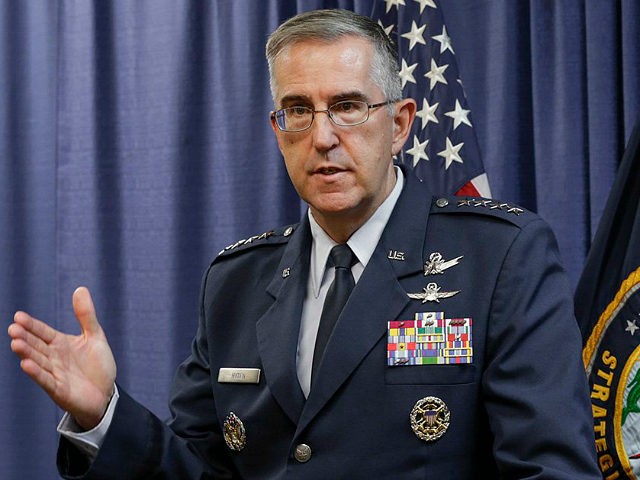WASHINGTON D.C. – The commander in charge of the nation’s nuclear forces on Tuesday warned that the U.S. needs to modernize its nuclear forces in the face of adversaries’ advancing capabilities.
“At a time when our adversaries have significantly modernized and continued to upgrade their nuclear forces, nearly all elements of the nuclear triad are operating beyond their designed service life,” Air Force Gen. John Hyten told the Senate Armed Services Committee.
The “triad” refers to the three legs of U.S. nuclear deterrence: submarines, ground-based systems, and bombers.
Hyten said as the U.S. deemphasized strategic nuclear deterrence, adversaries ramped theirs up. He said that, in 2006, Russia began an aggressive effort to modernize its nuclear force and “they continue that to this day.”
He called Russia’s breach of the Intermediate-Range Nuclear Forces (INF) Treaty, which requires the U.S. and Russia to eliminate intermediate-range cruise and ballistic missiles, a “concern.”
Russia in February deployed an operational unit of cruise missiles that violated the treaty, according to The New York Times.
“We have no defense for it, especially in defense of our European allies,” Hyten said. “It is a concern and we’re going to have to figure out how to deal with it as a nation.”
Senate Armed Services Committee Chairman John McCain (R-AZ) said the violation “is a clear signal of the elevated role of tactical nuclear weapons in Russian military doctrine.”
“Moreover, this violation leaves the United States as the only country in the world, abiding by treaty limits on its intermediate range missile forces,” he said. “Merely hoping that Russia will return to treaty compliance is insufficient to the seriousness of this threat.”
He also listed China, North Korea, and Iran as top concerns, particularly China’s advances in countering the U.S. in the space domain and North Korea’s recent proven ability to launch a solid-fueled missile versus a liquid-fueled missile. Solid-fuel missiles are harder to detect in advance, require less support, and can be deployed more quickly.
Hyten also updated senators on a Pentagon review of the nation’s nuclear force posture, one of the first things President Trump ordered after taking office. He said the review has just kicked off, with a six-month timeframe. It will also recommend responses to Russia’s INF violation, he said.
He also said there would be a six-month ballistic missile defense review that will soon kick off.
But he warned that strategic deterrence no longer just referred to nuclear weapons, but other realms, including space and cyber.
“I think what’s missing is a broader discussion of what 21st-century deterrence really means. That involves the nuclear capabilities as the backstop; but fundamentally space, cyber, conventional, all the other elements as well. When we talk about deterrence, we tend to fall back 50 years ago to the deterrence model of the ’60s, ’70s and ’80s,” he said.
Hyten said the U.S. would need to spend roughly six percent of the defense budget over 30 years to modernize the nation’s nuclear arsenal, an increase from 3.5 percent currently.
He said his top priority is to modernize the triad: replacing the Ohio-class submarines, replacing the Minuteman intercontinental ballistic missiles, and fielding the B-21 Long Range Strike Bomber.
He said his second priority is to modernize the nuclear weapons themselves, and his third priority is to modernize the nuclear command and control.
Hyten warned that if Congress passes a short-term funding measure for the rest of the year, known as a “continuing resolution,” instead of a full 2017 budget, it would delay the programs to modernize the nuclear force. Those delays could break contracts and incur more fees for taxpayers, he said.
McCain said Congress supported modernizing each leg of the nuclear triad in the 2017 defense authorization and appropriation bills.
“Modernization is not cheap, but it is affordable,” he said.

COMMENTS
Please let us know if you're having issues with commenting.